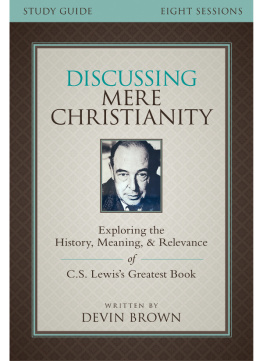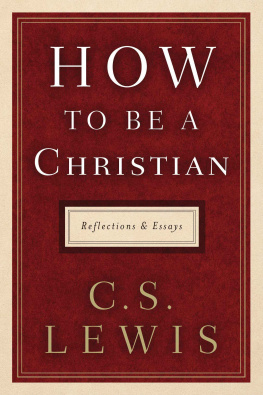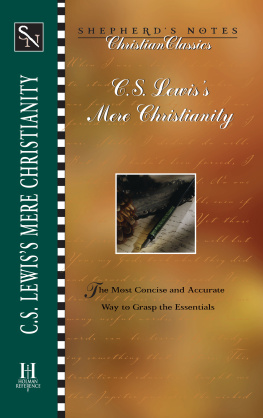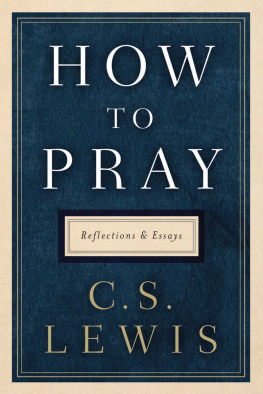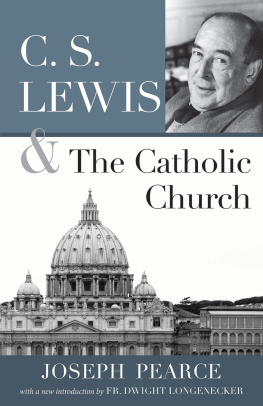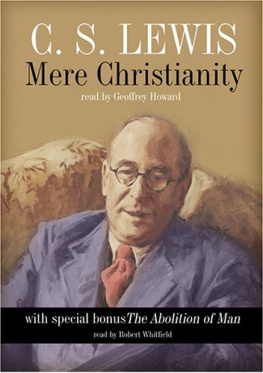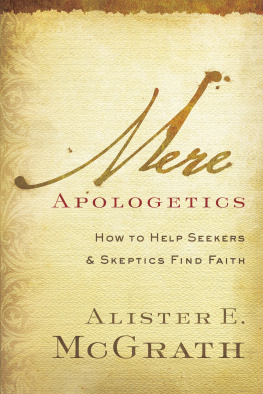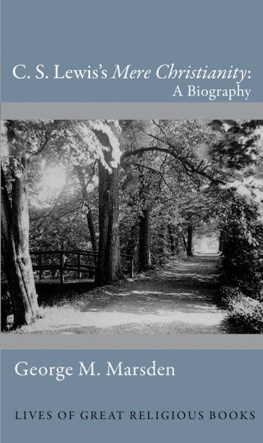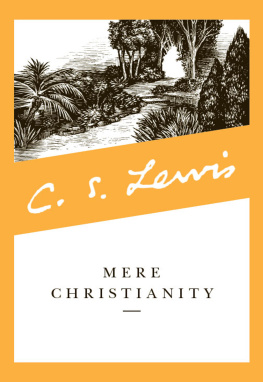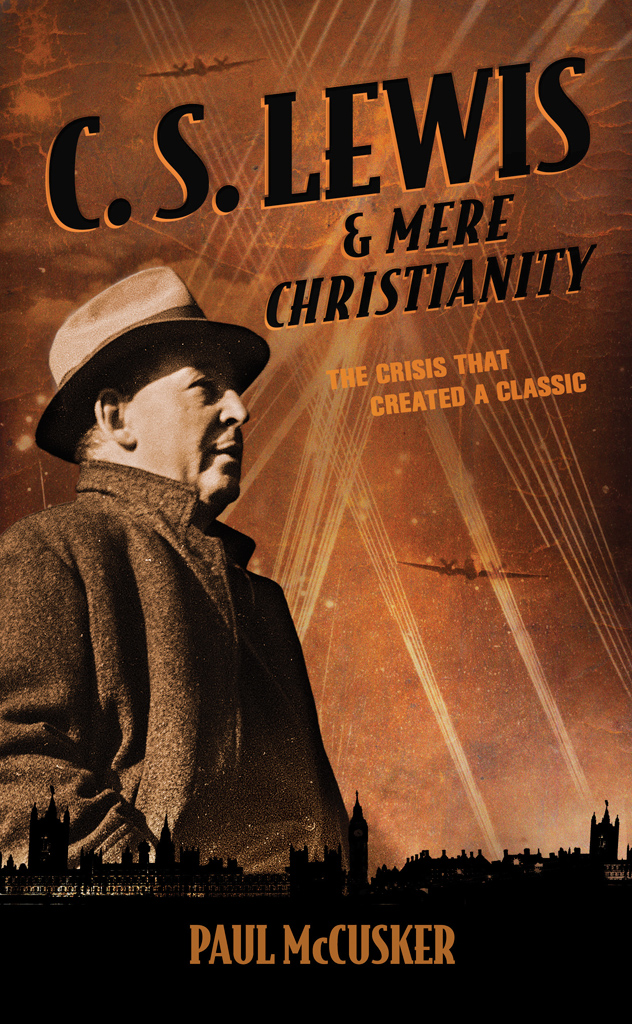C. S. Lewis and Mere Christianity: The Crisis That Created a Classic
2014 Focus on the Family
ISBN: 978-1-62405-322-1
A Focus on the Family book published by
Tyndale House Publishers, Inc., Carol Stream, Illinois 60188
Focus on the Family and the accompanying logo and design are federally registered trademarks of Focus on the Family, 8605 Explorer Drive, Colorado Springs, CO 80920.
TYNDALE and Tyndales quill logo are registered trademarks of Tyndale House Publishers, Inc.
Scripture quotations taken from the King James Version.
No part of this publication may be reproduced, stored in a retrieval system, or transmitted in any form or by any means electronic, mechanical, photocopy, recording, or otherwise without prior written permission of Focus on the Family.
Regarding the letters of C. S. Lewis: The abbreviations in quotations from letters have been spelled out for easier reading. The author has photocopies of most of the letters referenced in this book courtesy of the BBC Written Archives in Caversham, England. For the readers sake, page numbers from Walter Hooper, ed., The Collected Letters of C. S. Lewis, vol. 2, Books, Broadcasts, and the War (19311949) (New York: HarperCollins, 2004), have been added.
Editor: Marianne Hering
Cover design by Stephen Vosloo
Air-raid artwork, copyright cjp/iStockphoto. All rights reserved.
Aircraft artwork, copyright narvikk/iStockphoto. All rights reserved.
Photograph of Lewis, copyright Time & Life Pictures/Getty Images. All rights reserved.
Photograph of skyline, copyright Elisabeth Pollaert Smith /Getty Images. All rights reserved.
Cover texture by Lost & Taken.
The author is represented by Books & Such Literary Agency, Janet Kobobel Grant, 52 Mission Circle, Suite 122, PMB 170, Santa Rosa, CA 95409-5370, www.booksandsuch.com.
Library of Congress Cataloging-in-Publication Data
McCusker, Paul, 1958
C. S. Lewis and Mere Christianity : the Crisis That Created a Classic / by Paul McCusker.
pages cm
A Focus on the Family book
Includes bibliographical references and index.
ISBN 978-1-62405-322-1 (alk. paper)
1. Lewis, C. S. (Clive Staples), 1898-1963. Mere Christianity. 2. Lewis, C. S. (Clive Staples), 1898-1963 Religion. 3. Authors, English 20th century Biography. 4. Christianity and literature. I. Title.
PR6023.E926Z7945 2014
823'.912 dc23
2014009524
ISBN 978-1-62405-369-6 (ePub); ISBN 978-1-62405-370-2 (Kindle); ISBN 978-1-62405-368-9 (Apple)
Build: 2014-05-22 14:46:49
Prologue
1918
J ACK L EWIS OR C LIVE S TAPLES L EWIS , as he was officially known clutched his rifle and marched across the French field of Mont Bernanchon. The ground ahead was pitted with large holes made by the cannon shells that had been falling since the campaign began. Sergeant Harry Ayres a man Jack respected as a father figure accompanied him on the careful march across the field.
It was a spring evening and not a very pleasant one for the soldiers fighting in the Great War, as it was then called. To honor national alliances around Europe, young men of Britain and France had been drafted to repulse the German army after it invaded Belgium and marched into France. The warring sides had been fighting there for four years, mostly at an impasse, by the time Jack showed up. The only advance either side made was in the number of wounded and dead.
There were moments when the acrid smoke cleared enough for Jack to see the French village of Riez du Vinage to the northeast. At any other time it might have been a nice place to visit. Now it was merely a plot of land to be captured.
Though shells burst and gunfire sounded nearby, Jack and Sergeant Ayres stopped to consider their position. They were part of an aggressive push, their battalion moving behind a creeping barrage of shells from the British. It was unclear whether theyd advanced too far and that was worrisome.
Jack was a five-footten, heavy-set young man, only nineteen years old, and a would-be intellectual before the First Battalion of the Somerset Light Infantry enlisted him for battle. His qualifications as an officer were marginal, yet he was already a second lieutenant. Hed been fighting in the war for only a few months, having arrived the previous November. His experience thus far included digging a lot of trenches, feeling miserably cold and wet, enduring a pervasive weariness, and spending a month in the hospital with trench fever. He had also learned how to fall asleep while marching, how to wear the same boots so long that they felt as if theyd become attached to his feet, and how to ignore the stiff corpses scattered all around him.
Then the German army launched a major offensive in March. Now, in mid-April, Jack was part of the counterattack. So far the campaign was going better than expected. Many of the German soldiers gave up. At one point Jack himself had taken sixty German prisoners. But that morning the enemy regrouped for an attack from the village. The Allied forces fought back.
Explosions sounded from somewhere ahead. Men cried out and fell.
Jack looked to Ayres, the more experienced soldier. In an instant the two men realized the shells werent coming from the Germans ahead, but from the British artillery behind them. The infantry had gained more ground than the commanders had realized. Jack and Ayres were now in the line of fire from their own cannons.
Another shell exploded.
Sergeant Harry Ayres was killed instantly by the blast. For Jack, everything went silent, and the ground in front of [him]
1
PEACE FOR OUR TIME
W ITHIN TWENTY YEARS AFTER THE First World War the War to End All Wars as it was called the world moved toward yet another global conflict. A failed painter named Adolf Hitler rose through the political ranks in Germany by spouting an extreme nationalism that sought to reestablish Germanys preeminence among the European nations. In defiance of the peace treaties established at the end of World War I, Hitler rebuilt Germanys military might. Through the National Socialist (Nazi) Party, Hitler confounded his critics with shrewd political maneuvering, rising to the highest position of power. He became aggressive, establishing a totalitarian regime within his country and looking outward to reclaim territory Germany had lost after the last war. He demanded that the German Aryan master race be united, regardless of where the Aryans lived geographically. If Hitler had to invade other countries to make that happen, then he would.
The more aggressive Hitler became, the more passively the leaders in the surrounding countries seemed to respond to him. Britains Prime Minister Neville Chamberlain was an idealist and was convinced that reason would prevail over tyranny. Certainly no one wanted a repeat of the Great War. Chamberlain believed everyone, including Hitler, truly wanted peace.
N EVILLE C HAMBERLAIN
Arthur Neville Chamberlain (18691940), born near Birmingham, England, was the son of a successful industrialist and progressive lord mayor of that city. As a young man he worked as a planter in the Bahamas (18901897); then he returned to England to pursue an industrial and political career. He was elected as a Conservative to Parliament in 1918 and, afterward, held various government positions (postmaster general, minister of health, minister of welfare). He served as the chancellor of the exchequer from 1931 until May 1937, when he succeeded Stanley Baldwin as prime minister.


